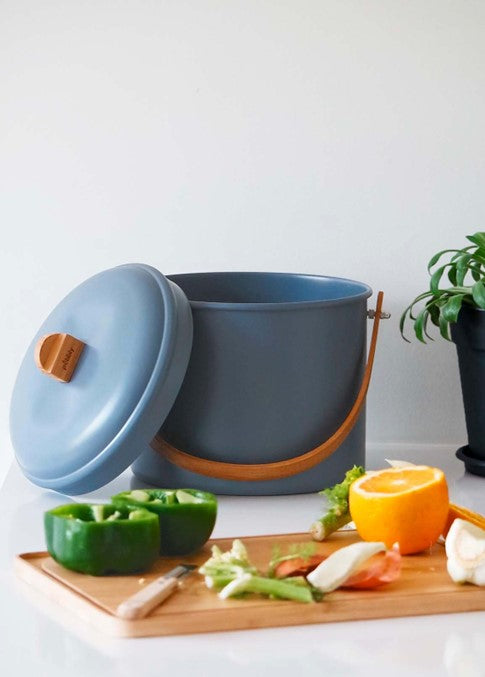
5 Quick Tips for Low Waste Entertaining
The Fourth of July is often filled with quintessential summer experiences: barbeques, pool parties, beach days, and fireworks. Many people drive to different cities to get the best view of the fireworks. Others drive to spend the day with friends and family. Because these festivities often take place outside and in public places, single-use plates, cups, and utensils abound. Cars and barbeques release CO2 into the air. Fireworks produce noise and air pollution. Trash litters outdoor spaces.
But don’t worry – not all is not lost with Pebbly! A few small changes to your usual party and summer habits can have an impact. Even better, they may spark conversation which lead to even more small changes that add up over time. With a few simple swaps, you can help the planet and party on. Here are five tips to reduce your carbon footprint this Fourth of July:

1. Transport food and drinks in reusable bags and containers.
If you are bringing food to someone else’s house, a park, or a beach, ditch the plastic bags and bottles. Single-use plastic bags can live in landfills for an estimated 1000 years before breaking down. While they wait, they shed microplastics that end up in bodies of water where we and other animals drink them unknowingly. Instead, swap these environmental catastrophes for bags that can be washed and gifted without causing damage to the environment.
Pebbly’s Organic XL Everywhere Bag is the perfect way to carry chips, hot dogs, burgers, and drinks without adding to the heaping trash cans and landfills. If you’re not bringing food, it can even be used to carry towels, clothes, and anything else you might need for a day out. Made of organic cotton and Jute, this bag can be washed and dried, so no need to worry about sand, dirt, or spills. If you want to bring the party host something nice, try this wine bottle carrier instead of the throwaway carriers at grocery stores. The host can reuse this bag for their groceries or gift it to someone else at the next party.

2. Be mindful of how much food you make and compost what you can.
An equivalent of 130 billion meals or almost 40% of all food is wasted in the United States. This is for a variety of reasons ranging from misunderstanding expiration dates, buying too much food and letting it mold, cooking too much food, and throwing away leftovers. The first step in preventing excess food is knowing how many people you should be cooking for. How many vegetarians are coming, how many people want hot dogs over hamburgers, and how many people will stay until you serve dessert? If you want to ensure you have enough food by making extra, ask guests to bring containers like these stackable glass ones that they can take food home in, and if you’re going to someone else’s house, bring your containers.

If there are still leftovers you don’t want or an excess of food scraps, learn what can be composted in your area or what you can compost at home. Check out this blog post for an introduction to composting if you’re new, but the best place to start is understanding what composting is available in your area and if there isn’t any, whether or not you can do it yourself. Composting can be easy with counter top bins that act like mini trash cans for scraps while also reminding you what happens to your food while it decomposes.

3. Pay attention to the materials you use to prepare and serve your food.
With such a food-centered holiday, it can be easy to ignore the materials that touch your food as you prep it. You don’t have to transfer your cheeses to a plastic tray after cutting them into bite-size pieces when you have a cutting board that can double for prepping and serving. Materials that are good for the earth are often good for humans and happen to look beautiful at the same time. By using organic cotton, bamboo, steel, and borosilicate glass, you reduce the microplastics you wash down your drain and invest in tools that you’ll use for many years. From bamboo tongs to glass pitchers, your guests will notice the difference in the materials you use to serve them food and drinks this summer.

4. Swap at-home fireworks and sparklers for LED lights or the stars.
Fireworks release heavy metals and carcinogens when they light up the sky on the Fourth of July, and while they are beautiful, it is hard to justify their air pollutants. If the city’s fireworks aren’t quite enough for you or they’re too far away to see where you are, try alternatives. Solar lanterns that you charge all day while you’re barbequing and swimming or LED candles and string lights can be a great way to light up the night without releasing any toxic chemicals into the environment. Better yet, find a place where you can see the stars and spend some time finding all the constellations and reminding yourself why it is important to care about the planet.
5. Participate in a beach, park, or neighborhood cleanup.
After all the Fourth of July festivities have ended, there is often an unprecedented amount of trash laying. Especially after a beach party and in any park or neighborhood whose drains run into bodies of water, it is important to collect the trash before it can further damage ecosystems and waterways. The best way to do this is to participate in a cleanup. Be part of the solution, even if you are the only onion the beach collecting trash. However, cleanups are more fun when we do them with friends. Some waves start with a ripple, so encourage others to clean up outdoor spaces too.

A little goes a really long way when it comes to helping the planet. Small acts of environmentalism can change the way you think about the materials your stuff is made of and the “trash” you throw away. Theca spark conversation with others when you bring your cheese and hot dogs out on a bamboo cutting board to serve. Your sustainable products can match your lifestyle with beautiful aesthetics that don’t damage the earth. We can all be part of the solution, and it starts with you.


